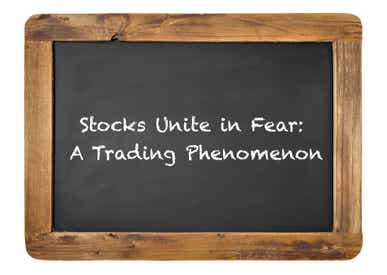Stocks Unite in Fear: A Trading Phenomenon

Stocks Unite in Fear: A Trading Phenomenon
By:Kai Zeng
Do stocks generally show stronger correlations and move more in sync during periods of uncertainty?
- Market corrections aren't random.
- Do stocks really show stronger correlations during corrections?
- VIX can help decipher connections in stock performance.
When the stock market experiences a downturn, often termed a market correction, it is not merely a sequence of random fluctuations.
The prevalent market belief is that stocks generally show stronger correlations and move more in sync during periods of uncertainty. But what does historical data say about this? For traders keen on efficiently managing portfolio risks in times of market distress, understanding this behavior is crucial. Let's delve into historical data to test the validity of this hypothesis.
A key tool in deciphering these connections is the CBOE Volatility Index (VIX), commonly known as the market's “fear index.” For example, during high VIX periods, signaling considerable fear or uncertainty, companies like Nvidia (NVDA) and broader market indices such as the S&P 500 ETF (SPY), tend to align more closely.
Typically, NVDA and SPY have a moderate positive correlation of 0.56.
.png?format=pjpg&auto=webp&quality=50&width=1000&disable=upscale)
NVDA/SPY correlation during turmoil
However, this correlation climbs notably during market turmoil compared to calmer periods.
_(1).png?format=pjpg&auto=webp&quality=50&width=1000&disable=upscale)
This pattern of stocks moving together isn’t just seen in individual stocks but across different sectors of the economy.
Technology companies like Apple (AAPL), energy entities represented by the Energy ETF (XLE) and retail behemoths such as Costco Wholesale (COST), all exhibit this pattern. Normally, their correlations are modest, yet during volatile market phases, they intensify remarkably.
The correlation among these diverse sectors or their representatives sharpens to an average of 0.84, transforming from moderate to strongly positive.
_(2).png?format=pjpg&auto=webp&quality=50&width=1000&disable=upscale)
Corrections negate diversification
The increasing similarity in movements among different stocks and sectors during high volatility challenges the conventional strategy of investment diversification—the practice of spreading investments to manage risk. In essence, when everything declines simultaneously, the benefits of diversification are negated.
In such scenarios, ironically, reducing overall market exposure may prove to be more effective than employing complex trading strategies like hedging with additional positions, which could introduce further risks due to these synchronized market movements.
Recognizing how stocks are interconnected during varying market conditions is essential, not only for traders but for anyone interested in making well-informed investment decisions amid uncertainties. By examining these relationships, investors can devise more effective strategies to manage and navigate through these turbulent times.
Kai Zeng, director of the research team and head of Chinese content at tastylive, has 20 years of experience in markets and derivatives trading. He cohosts several live shows, including From Theory to Practice and Building Blocks. @kai_zeng1
For live daily programming, market news and commentary, visit tastylive or the YouTube channels tastylive (for options traders), and tastyliveTrending for stocks, futures, forex & macro.
Trade with a better broker, open a tastytrade account today. tastylive, Inc. and tastytrade, Inc. are separate but affiliated companies.
Options involve risk and are not suitable for all investors. Please read Characteristics and Risks of Standardized Options before deciding to invest in options.
tastylive content is created, produced, and provided solely by tastylive, Inc. (“tastylive”) and is for informational and educational purposes only. It is not, nor is it intended to be, trading or investment advice or a recommendation that any security, futures contract, digital asset, other product, transaction, or investment strategy is suitable for any person. Trading securities, futures products, and digital assets involve risk and may result in a loss greater than the original amount invested. tastylive, through its content, financial programming or otherwise, does not provide investment or financial advice or make investment recommendations. Investment information provided may not be appropriate for all investors and is provided without respect to individual investor financial sophistication, financial situation, investing time horizon or risk tolerance. tastylive is not in the business of transacting securities trades, nor does it direct client commodity accounts or give commodity trading advice tailored to any particular client’s situation or investment objectives. Supporting documentation for any claims (including claims made on behalf of options programs), comparisons, statistics, or other technical data, if applicable, will be supplied upon request. tastylive is not a licensed financial adviser, registered investment adviser, or a registered broker-dealer. Options, futures, and futures options are not suitable for all investors. Prior to trading securities, options, futures, or futures options, please read the applicable risk disclosures, including, but not limited to, the Characteristics and Risks of Standardized Options Disclosure and the Futures and Exchange-Traded Options Risk Disclosure found on tastytrade.com/disclosures.
tastytrade, Inc. ("tastytrade”) is a registered broker-dealer and member of FINRA, NFA, and SIPC. tastytrade was previously known as tastyworks, Inc. (“tastyworks”). tastytrade offers self-directed brokerage accounts to its customers. tastytrade does not give financial or trading advice, nor does it make investment recommendations. You alone are responsible for making your investment and trading decisions and for evaluating the merits and risks associated with the use of tastytrade’s systems, services or products. tastytrade is a wholly-owned subsidiary of tastylive, Inc.
tastytrade has entered into a Marketing Agreement with tastylive (“Marketing Agent”) whereby tastytrade pays compensation to Marketing Agent to recommend tastytrade’s brokerage services. The existence of this Marketing Agreement should not be deemed as an endorsement or recommendation of Marketing Agent by tastytrade. tastytrade and Marketing Agent are separate entities with their own products and services. tastylive is the parent company of tastytrade.
tastyfx, LLC (“tastyfx”) is a Commodity Futures Trading Commission (“CFTC”) registered Retail Foreign Exchange Dealer (RFED) and Introducing Broker (IB) and Forex Dealer Member (FDM) of the National Futures Association (“NFA”) (NFA ID 0509630). Leveraged trading in foreign currency or off-exchange products on margin carries significant risk and may not be suitable for all investors. We advise you to carefully consider whether trading is appropriate for you based on your personal circumstances as you may lose more than you invest.
tastycrypto is provided solely by tasty Software Solutions, LLC. tasty Software Solutions, LLC is a separate but affiliate company of tastylive, Inc. Neither tastylive nor any of its affiliates are responsible for the products or services provided by tasty Software Solutions, LLC. Cryptocurrency trading is not suitable for all investors due to the number of risks involved. The value of any cryptocurrency, including digital assets pegged to fiat currency, commodities, or any other asset, may go to zero.
© copyright 2013 - 2026 tastylive, Inc. All Rights Reserved. Applicable portions of the Terms of Use on tastylive.com apply. Reproduction, adaptation, distribution, public display, exhibition for profit, or storage in any electronic storage media in whole or in part is prohibited under penalty of law, provided that you may download tastylive’s podcasts as necessary to view for personal use. tastylive was previously known as tastytrade, Inc. tastylive is a trademark/servicemark owned by tastylive, Inc.
Your privacy choices